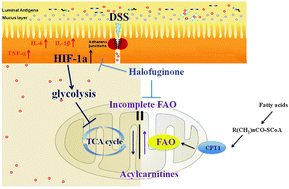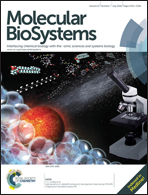Halofuginone reduces the inflammatory responses of DSS-induced colitis through metabolic reprogramming†
Abstract
Hypoxia and inflammation have been identified as the hallmarks of colitis, intertwined with metabolism. Here, we report that halofuginone (HF), an antiparasitic drug, attenuates dextran sulfate sodium (DSS)-induced colitis in mice, as represented by attenuating the disease activity index, inhibiting colonic shortening, ameliorating colonic lesions and histological signs of damage, reducing colonic myeloperoxidase activity, and suppressing the production of pro-inflammatory cytokines in colon tissue. Intriguingly, the hypoxia-inducible factor 1alpha (HIF-1α) and tumor necrosis factor alpha were also suppressed by HF treatment in colon tissues, exhibiting a tissue-specific effect. To further reveal the metabolic signatures upon HF treatment, mass spectrometry-based metabolomic analysis of the small molecular metabolites in liver, spleen and colon tissues was performed. As a result, we found that HF treatment counteracted the levels of acylcarnitines, including palmitoyl-L-carnitine, isobutyrylcarnitine, vaccenylcarnitine, and myristoylcarnitine, in colon tissues with DSS induction, but no significant change in the levels of acylcarnitines was observed in liver or spleen tissues. The metabolic signatures may indicate that incomplete fatty acid oxidation (FAO) in the colon could be restored upon HF treatment as the tissue-specific metabolic characterization. Taken together, our findings uncovered that the HF potentiated anti-inflammatory effect in DSS-induced colitis in mice and its underlying mechanisms could be associated with the inhibition of HIF-1α and reduced levels of acylcarnitines, suggesting that both the inhibition of HIF-1α and the counteraction of incomplete FAO might be useful in the prevention and treatment of inflammatory bowel disease.


 Please wait while we load your content...
Please wait while we load your content...